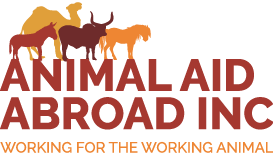APOWA Oct/Nov Update - Treating Illnesses and Training Communities to Care for Working Animals
As October brings the relief of post-monsoon breezes and a shift in the season, The Working Animal Welfare Project (APOWA) celebrates another month of making a tangible difference in the lives of working animals and their owners thanks to Animal Aid Abroad.
The dedicated vets and team provide compassion, education and essential healthcare to each community they visit.
A Month of Progress and Care
Throughout this reporting period, APOWA’s efforts reached an impressive 96 animals, providing them with not only healthcare but also a renewed sense of vitality. The mobile clinic made rounds across the region, delivering emergency health care that not only aids the animals but sustains the livelihoods of their owners too. Vaccination drives saw 319 animals protected against common diseases, safeguarding the community's valuable working animals.
Here's a quick overview of the treatments:
Stomach infections and food poisoning were a common issue, with several animals suffering from colic pain and dysentery due to contaminated food or water.
Fever and viral infections were prevalent, often caused by exposure to rain and harsh conditions while working.
Wounds and abscesses, including tack-related wounds and injuries from carts, were treated in multiple cases.
Skin conditions, such as eczema and abscesses, were linked to poor stable conditions and mineral deficiencies.
Most of the animals were treated at planned clinic locations, though some were assisted outside of these visits after receiving calls for help. The team has been dedicated to providing urgent care, ensuring that working animals get back to full health.
Moreover, APOWA’s helpline desk continued to be a valuable lifeline, helping 35 animal owners receive expert guidance on animal care, from nutrition to preventive health. This essential service is truly a testament to how small actions can make big changes for communities dependent on these animals.
A Glimpse at the Number of Animals Helped
Total Animals Examined and Treated: 84
Animals Examined with Advice Given: 12
Vaccinations: 198 for Goat Pox (LSD) and 121 HS vaccines
These numbers are more than statistics; they represent animals whose lives have been touched by care and compassion, and owners who can rest a little easier knowing their animals are receiving the best support.
Bringing Knowledge and First Aid Closer to Home
A total of 78 animal owners received training in proper nutrition, disease prevention, and welfare practices, all of which are integral to ensuring animals well-being and health. Additionally, 15 community volunteers, the ‘Working Animal Champions,’ were supplied with first aid kits and trained to address emergencies right in their villages. They went on to provide immediate relief to 62 bullocks in need, with immense pride in their newfound roles.
Follow-Ups and Community Motivation
Our team continued with diligent follow-ups, visiting animals treated in previous periods to assess their health and ensure their recovery was on track. We also provided guidance on keeping sheds clean and providing safe drinking water—simple steps that prevent a host of health issues.
The Working Animal Champions, trained in first aid, have been energised to spread awareness in their villages. From proper shelter management to creating hygienic spaces for animals, they’re inspiring their communities to take animal welfare seriously. Each kit provided is a badge of honour for these champions, who now feel empowered to keep their animals healthy and cared for.
Looking Forward to a Brighter Future for Working Animals
As APOWA reflects on this month’s achievements, the focus remains on creating lasting change and building a future where animals and humans alike benefit from the care and knowledge spread through the Working Animal Welfare Project. With each visit, each training and each smile from an animal owner, we’re one step closer to a compassionate, healthier future for working animals.









